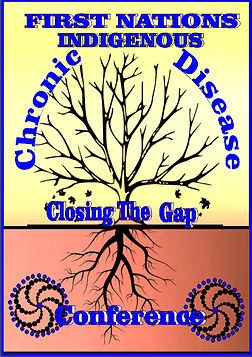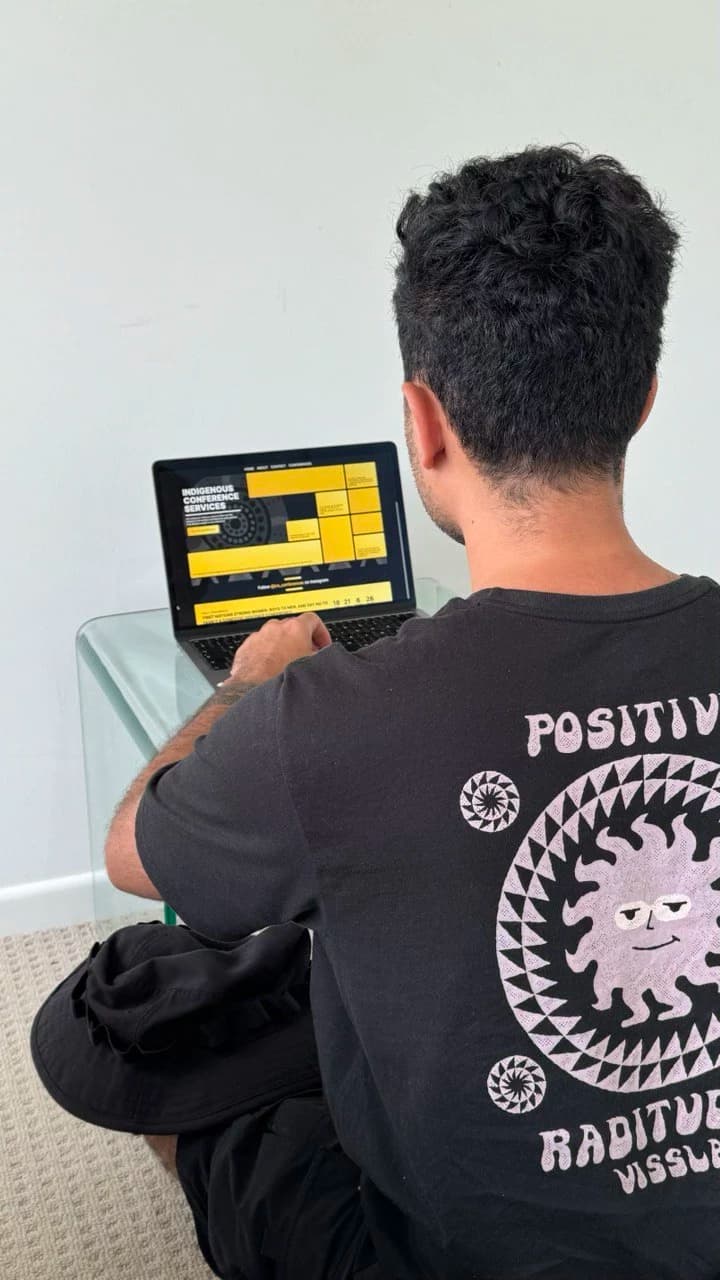ACKNOWLEDGEMENT TO COUNTRY
In Australia, the protocol is to recognise the Traditional Owners of the land to which we are gathering. Therefore, all presentations must begin with an acknowledgement to country and to local Traditional Elders: “We wish to acknowledge and respect the traditional custodians whose ancestral lands we are to meet upon. We acknowledge the deep feelings of attachment and relationship of Aboriginal peoples to Country. We also pay respects to the cultural authority of Aboriginal peoples visiting / attending from other areas of Australia who are present here”.
Indigenous Conference Services acknowledges and pay our respect to the Traditional people of the Country. "Welcome to Country" ceremony and "acknowledging the traditional custodians" of the land shows respect for Aboriginal people as Australia's First Peoples. Ceremonies and protocols are a fundamental part of Aboriginal cultures.
The Conference
The National First Nations Chronic Diseases Close The Gap Conference is scheduled to be held on July 22-24, 2024 in Gold Coast, Queensland. Over the past ten years, the conference has attracted thousands of attendees bringing together representatives from all states and territories governments, First Nations medical services and mainstream health sectors, community-controlled organisations, First Nations communities, allied health professionals and non-government organisations, primary health networks and researchers. The conference is hosted by Indigenous Conference Services (Australia) with a great line up of First Nations speakers from all throughout Australia in partnership with grassroots community organisations. The conference will provide insights into the successes of Indigenous organisations and health care professionals, focusing on solutions to First Nation’s peoples with chronic diseases and highlights the successes of chronic disease policies and management programs implemented in Indigenous communities.
The conference will highlight many of the achievements gained against the four major chronic diseases namely cancer, diabetes, kidney and heart failure issues and the battle to stem the ongoing diseases within First Nations communities.
Cancer is a significant health issue among First Nations populations, with higher rates of some cancers and poorer outcomes compared to non-Indigenous populations. First Nations patients often face barriers to accessing healthcare, including geographical isolation, cultural differences, and a lack of healthcare resources in rural and remote communities. These factors can result in late diagnosis and a lack of access to effective treatments, leading to higher rates of cancer-related deaths. Addressing these disparities requires a comprehensive approach that takes into account the unique cultural and socio-economic circumstances of Indigenous populations and involves community-led solutions to improve access to cancer screening, diagnosis, and treatment. Similarly, First Nations Australians are disproportionately affected by diabetes with rates of diabetes being two to four times higher than in non-Indigenous populations.
The reasons for this disparity are complex and multifactorial, but include a combination of genetic, environmental and lifestyle factors. The impact of diabetes can result in a range of serious health problems, including heart disease, kidney disease, blindness, and amputations. Diabetes can also impact on mental health, reduce quality of life and increase the burden of care on families and communities. Furthermore, kidney disease is a significant health issue affecting Indigenous people in Australia. Indigenous Australians are overrepresented in the rates of kidney disease, with Indigenous people four to five times more likely to develop end-stage kidney disease (ESKD) than non-Indigenous Australians. This high prevalence of kidney disease is largely due to the higher rates of diabetes and hypertension due to lack of access to healthy food, limited access to healthcare, and a higher burden of infectious diseases such as hepatitis B and C, which can also cause kidney disease. Addressing these issues will require a multi-faceted approach that addresses the social determinants of health, improves access to care, and promotes greater cultural understanding and sensitivity in the healthcare system. Moreover, heart disease is another major health concern for First Nations peoples with studies showing that the prevalence of heart disease in Indigenous populations is about 50% higher. This disparity is largely due to a higher prevalence of risk factors such as smoking, poor diet, physical inactivity, and high blood pressure.
One of the key contributing factors to the high rates of heart disease in First Nations communities is the legacy of colonization and the ongoing socio-economic disadvantage faced by Indigenous Australians. This includes limited access to quality healthcare services, limited opportunities for physical activity, and exposure to unhealthy diets and environments. Furthermore, the ongoing impacts of trauma, including the Stolen Generations, have had a significant impact on the health and wellbeing of Indigenous Australians, including their heart health.
Despite the high rates of heart disease in Indigenous communities, there has been limited investment in culturally appropriate and evidence-based programs to prevent and treat heart disease in these populations. This has resulted in a lack of access to appropriate and effective care, leading to poorer health outcomes for Indigenous Australians. To address this disparity, there is a need for a coordinated and sustained effort to address the underlying social determinants of health, as well as increasing investment in culturally appropriate and evidence-based programs to prevent and treat heart disease in Indigenous populations. This includes improving access to healthcare services, promoting healthy lifestyles, and addressing the ongoing impacts of colonization and socio-economic disadvantage. With the right support and resources, it is possible to improve the health and well-being of Indigenous Australians and reduce the burden of cardiovascular diseases in First Nations communities.
The event is based upon the principal belief that Indigenous health must be approached from a holistic view, which encompasses body, mind and spirit; thus, leading to the fundamental rights of self-determination. The conference recognises that treating our health must be done by treating the whole person, through mind, body, soul and culture. No matter what your culture is if you are a First Nations person, statistics show that health, education and the justice system is monstrously weighted against First Nations People. The 2021/2022 Closing the Gap in Indigenous Health Report further highlights how wide the gap is. In today’s society, Indigenous people have a varied lifestyle, ranging from inner-city living to isolated communities. Therefore, there is no set approach to dealing with health issues, as you have to look at the environment that you live in and, more importantly, the agencies that are available to assist.
The conference is designed to bring together both government and non-government agencies who are working in the Indigenous health sector, therefore focusing on Indigenous Chronic Disease Health and strengthening the life expectancy of First Nations people to equal that of non-Indigenous people. In Australia, the most successful initiatives in First Nations Health are the Aboriginal Medical Services (AMS) and now the partnerships between government and communities. The first Aboriginal community-controlled health service was established in New South Wales and has been operational for the past forty (40) years. Today, there are over 120 AMS and countless numbers of Primary Health Care Posts in First Nations communities in Australia.
CONFERENCE THEME AND FOCUS
Diabetes, cardiovascular disease, kidney disease and cancer affecting Indigenous communities
Aboriginal & Torres Strait Islander health care coordination
End of life care
Place-based initiatives
Primary health network initiatives
Building capacities for improving health outcomes
Contemporary health initiatives, health policy, researchers, model of care
Aboriginal and Torres Strait Islander health leadership, workforce sector development, e-health, tools/applications and resources.
The conference theme is based upon an approach of “Prevention is better than Cure” which require a collaborative partnership between all stakeholders, working together to support First Nations communities in addressing all forms of chronic disease. The foundation of the conference is to share and discuss positive models of change and initiatives. The event is structured in such a way as to develop a wider methodology towards preventative programs that are culturally appropriate and therefore more likely to succeed. This conference is devoted to showing the positives in addressing chronic diseases in our communities and families. Hence, the event has been developed with the belief that it is time to promote the positives and successes in chronic disease program whilst still recognising that we still have a long way to go.
THE VISION
The conference is not politically based. Rather, it should be seen as an opportunity to access information that is not readily available. Today the world has become smaller with the invention of the internet and jet travel. As such, we are of the belief that there is nothing more empowering and more effective than people having an opportunity to network and collaborate. The conference vision for this event is to embrace the philosophy of First Nations community controlled and mainstream service providers through promoting an informative forum of research, health education and training of staff for the betterment of Indigenous health.
CONFERENCE OBJECTIVES
The most powerful mechanism that First Nations people have is the strength to overcome adversity through the power of sharing knowledge and therefore the conference will attempt to foster all of the issues set out in this conference.
This conference aims to improve the cultural competence of the Indigenous health workforce with a greater focus on culture within health care education.
Responsible partnerships combined with strong community leadership and advocacy will optimise access, quality and sustainability of culturally safe and appropriate health services to address chronic conditions.
Facilitate and engage with First Nations with respect to the sharing of information
Contribute to identify community health needs and develop and implement local responses and services
Provide an open and frank platform for discussion
Support First Nations communities health professionals and peak bodies through further networking
Highlight the positives of work being achieved at all levels with respect to the many different chronic disease programs and issues
To paint a positive approach to the management of chronic diseases
Provide a stimulus for networking in co-operation/partnerships from individuals, community level through to government authorities.
Portraying the different various lifestyles from inner-city to isolated communities
Sharing of information in regards to agencies, individuals and programs that may assist in overcoming chronic disease issues
Bringing together both government and non-government agencies who are working in the field of Indigenous chronic diseases, focusing on Closing the Gap and strengthening the life expectancy of First Nations peoples to equal that of non-indigenous people.
Highlight unique issues that relate specifically to First Nations communities in relation to their environment and socio-economic status.
EMPOWERING DELEGATES
This event guarantees the opportunity to enlarge your network and information base, thus empowering all delegates to make greater informed decisions within their professional and extended communities. Furthermore, it has been proven time and time again that events such as this empower and reinvigorate workers with new ideas and enthusiasm, with a greater feeling of support and new contacts that may be utilised for the betterment of their own local community. Whether you are an allied health professional, Indigenous health worker, medical professional or in an administrative clerical role within the organisation, this conference will provide excellent opportunities to gain and share information that will be of use to you and your organisation back in your community. The opportunities that this Conference provides to people involved in First Nations Health is the sharing of knowledge and development of long-term friendships/partnerships. This conference is designed from an Indigenous perspective, in which we all lend support to each other regardless of our employers. With all this in mind, we invite you to actively participate in the upcoming event.
Why Attend
This conference presents a unique opportunity for delegates to participate in a positive environment that is dedicated to the sharing of information and the empowering of all who attend. In our everyday working environment the day to day stresses of our positions tends to limit us in expanding our knowledge and networking. Whether you work at a community level or at governmental level the opportunity to network and gain contacts outside of your local region tend to be limited, this is why this conference will be so valuable to participants. Hence, all Indigenous people and non-indigenous people whether professional or community-based, who have a vested interest in juvenile justice are invited.
BENEFITS OF ATTENDING FOR THE EMPLOYER
As an employee, we are asked to present valid reasons why we should attend. Listed below are valid points that can be raised with your employer to justify your attendance: Staff attending conferences regularly tend to become long term employees. An event such as this adds to the positive morale of staff.
- Staff attending conferences regularly tend to become long-term employees.
- An event such as this adds to the positive morale of staff.
- Conferences are a great way of providing ongoing training.
- Provides the opportunity to further enhance the organisation's knowledge base.
- The opportunity for saving organisations money because of the short duration of the event.
- Allows delegates to showcase the organisation nationally and internationally.
- May provide organisations with new ideas.
- Gives organisations a showcase and voice at a national level.
- Provide an opportunity to evaluate various programs.
- Because this event is conducted over a short period, staff are only absent for a minimal number of days.
CALLING FOR PAPER
To ensure grassroots community programs are highlighted, no less than 50 per cent of the conference proceedings are and is devoted to community groups. If your paper is selected, you may have more than one presenter to present your paper. However, only two presenters will be entitled to the registration discount. If you are chosen to present at the conference, your paper will form part of the conference proceedings and be distributed at the conclusion of the event with all other presentations.
Guidelines in Submitting Paper:
- Papers should not contain offensive language and take into account cultural sensitivities of Australian first nation people.
- Papers must treat the themes in a manner that contributes to further discussion of conference aims.
- Conference papers must be presented in the finished format not less than 60 days prior to the event.
- Papers that are not chosen in the first round may be resubmitted in the second round.
- Papers MUST be submitted in Microsoft Word format. Papers in other formats will NOT be considered.
- Authors of papers presented at the conference will be formally notified of their acceptance in writing.
- A registration fee of $750 will apply to all persons submitting papers, payable within 7 days upon notification of acceptance.
- Papers should explore ways in which the themes show up in the philosophy of the conference.
- All papers must be presented in a positive and informative light.
- To submit a paper, please complete the online form at this link: SUBMIT A PAPER HERE.
- Conferences are a great way of providing ongoing training and provide the opportunity to further enhance the organisation's knowledge base.
- Allows delegates to showcase the organisation nationally and internationally.
- May provide organisations with new ideas and gives organisations a voice at a national/international level.
- Provides an opportunity to evaluate various programs.
- Because this event is conducted over a short period, staff are only absent for a minimal amount of time.
GUEST SPEAKERS
The event is blessed with a kaleidoscope of guest speakers, sharing stories, successes and challenges they’ve overcome, presenting great opportunities and inspiration for delegates to participate in an event that is devoted to the sharing of Culture, Empowerment, Education & Networking. Drawn from a variety of cultural backgrounds, professional careers, and grassroots community commitments, this year’s conference speakers are the difference between an ordinary and extraordinary event; one that is soon forgotten and one which lingers in attendees' memories, a source of tremendous benefit long after the conference is over.
REGISTRATION
Register early to get a discount! Please note that registrations are set out in an affordable way for organisations, which changes on a monthly basis. Hence the earlier you register, the more savings for your organisation. Registration fees include all-day access to the event, available conference papers, daily lunch, and refreshments for registered delegates only. Fees do not include travel costs or accommodation. Registration fees must be received within 7 DAYS from being issued an invoice. Otherwise, bookings will not be considered. To register, please click on the registration button and complete the form. Upon receipt of your completed registration form, we will email you the tax invoice.
SPONSORING THE CONFERENCE
Flexible sponsorship packages are available. Sponsorship opportunities are only open to businesses and private enterprises, not individuals. To showcase your organisation to all conference delegates, ICS has developed hassle-free promotional opportunities and sponsorship packages according to your budget and tailored to your organisation’s needs.
- Gold Sponsorship ($10,000) includes: Keynote session or Break-out sessions, Waived registration fees for your selected staff, Complimentary seats at networking conference dinner, Complimentary display table & USB with photos for reporting purposes.
- Silver Sponsorship ($7,000) includes: Keynote session, Waived registration fees for your selected staff, Complimentary seats at networking conference dinner, Complimentary display table & USB with photos for reporting purposes.
- Bronze Sponsorship ($5,000) includes: Break-out Session, Waived registration fee for your selected staff, Complimentary Display Table & USB with photos for reporting purposes.
To sponsor the conference, please contact us. Indigenous Conference Services (Australia) will be of further assistance in tailoring your sponsorship arrangement. Please phone us on +61 4557 76 668 or send us your expression of interest to admin@icsconferences.org.
CONTACT US
For more information or inquiries, please reach out to us at the following contact details:
- ICS-MEES Pty Ltd
- Indigenous Conference Services (Australia)
- Postal Address: P.O. BOX 702 EDMONTON LPO QLD 4869
- Web: www.icsconferences.org
- Email: admin@icsconferences.org
- Phone: 07 40009111, +61 4557 76 668






